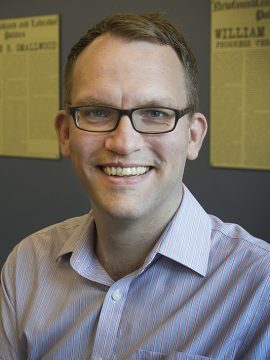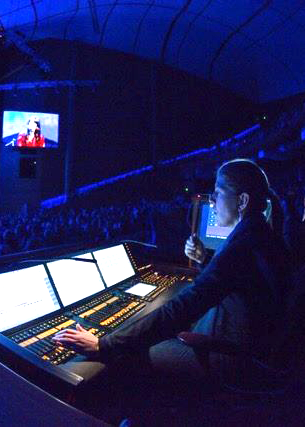Scott Matthews

Why did you choose your program at UBC and what did you enjoy most about it?
Given my research interests, political science was absolutely the right department for me. I was attracted mainly by my supervisor—Richard Johnston—but also by high-quality faculty across the department, especially Fred Cutler, who was also a committee member. Over the years I was at UBC, the department added a number of great people who also influenced my progress, especially Paul Quirk and Alan Jacobs.
What were some of your most meaningful experiences at UBC?
I made a great group of friends at UBC, many of whom remain close friends, colleagues and collaborators. I also benefited from excellent supervision, and exposure to a range of wonderful visiting scholars and other intellectual activities. Completing the Ph.D. was challenging in every way—intellectually, emotionally, financially, and even physically. But I always felt the department—faculty and fellow students—was behind me.
What choices did you make at UBC that contributed to your career success / journey?
Working with Richard Johnston is probably the biggest and most important choice I made. A brilliant scholar and a wonderful mentor, I simply wouldn’t be where I am, or the person I am today, without his guidance and support. I also chose to involve myself fully in departmental activities of all kinds in order to get the most out of the intellectual life of the place. That choice has influenced my perspective on my profession and shaped my view of the world, and, whenever I have the chance, it’s a choice I counsel students and junior colleagues to make as well.
What was your first job after graduation and what other jobs did you have before your current position?
My first job was as a professor at Queen’s University in the Department of Political Studies, where I was promoted and tenured in 2006.
Is your current career path as you originally intended? What challenges did you face in launching your career?
Original intentions are a funny thing to pin down, because it depends on the point in time you choose as your “point of origin.” Certainly by the time I was mid-way through my program at UBC, I was determined to get an academic appointment—so I’m obviously on the path I intended at that time.
What do you like about your current job and what do you find challenging? How does it relate to your degree?
The relationship to my degree is obvious: I’m a professor of political science. I love almost everything about this job: it is constantly stimulating, constantly changing. It brings me into contact with new and interesting people, young and old, all the time. I have the opportunity to do different things on a regular basis, whether in research, teaching or service roles. I have a great deal of autonomy in my job, which matters a lot to me. The biggest challenge these days is probably avoiding overworking myself, getting exhausted, and failing to prioritize other things and people in my life.
From your experience, what has been the value of having an Arts degree?
My three Arts degrees—aside from giving me a career—have changed the way I look at the world. At this point, to be honest, I can’t really connect to 18-year-old me who didn’t have any exposure to university. But I know that there was a moment, at some point in my early 20s, when I realized how much university education had transformed my view of the world.
Are there any other achievements or activities you would like to highlight?
From 2017 to 2019, I am an Alexander von Humboldt Research Fellow at the Mannheim Centre for European Social Research (MZES) at the University of Mannheim (Mannheim, Germany). During the 2016-17 academic year, I held the Fulbright Visiting Research Chair at Vanderbilt University (Nashville, Tennessee).
Scott Matthews



Why did you choose your program at UBC and what did you enjoy most about it?
Given my research interests, political science was absolutely the right department for me. I was attracted mainly by my supervisor—Richard Johnston—but also by high-quality faculty across the department, especially Fred Cutler, who was also a committee member. Over the years I was at UBC, the department added a number of great people who also influenced my progress, especially Paul Quirk and Alan Jacobs.
What were some of your most meaningful experiences at UBC?
I made a great group of friends at UBC, many of whom remain close friends, colleagues and collaborators. I also benefited from excellent supervision, and exposure to a range of wonderful visiting scholars and other intellectual activities. Completing the Ph.D. was challenging in every way—intellectually, emotionally, financially, and even physically. But I always felt the department—faculty and fellow students—was behind me.
What choices did you make at UBC that contributed to your career success / journey?
Working with Richard Johnston is probably the biggest and most important choice I made. A brilliant scholar and a wonderful mentor, I simply wouldn’t be where I am, or the person I am today, without his guidance and support. I also chose to involve myself fully in departmental activities of all kinds in order to get the most out of the intellectual life of the place. That choice has influenced my perspective on my profession and shaped my view of the world, and, whenever I have the chance, it’s a choice I counsel students and junior colleagues to make as well.
What was your first job after graduation and what other jobs did you have before your current position?
My first job was as a professor at Queen’s University in the Department of Political Studies, where I was promoted and tenured in 2006.
Is your current career path as you originally intended? What challenges did you face in launching your career?
Original intentions are a funny thing to pin down, because it depends on the point in time you choose as your “point of origin.” Certainly by the time I was mid-way through my program at UBC, I was determined to get an academic appointment—so I’m obviously on the path I intended at that time.
What do you like about your current job and what do you find challenging? How does it relate to your degree?
The relationship to my degree is obvious: I’m a professor of political science. I love almost everything about this job: it is constantly stimulating, constantly changing. It brings me into contact with new and interesting people, young and old, all the time. I have the opportunity to do different things on a regular basis, whether in research, teaching or service roles. I have a great deal of autonomy in my job, which matters a lot to me. The biggest challenge these days is probably avoiding overworking myself, getting exhausted, and failing to prioritize other things and people in my life.
From your experience, what has been the value of having an Arts degree?
My three Arts degrees—aside from giving me a career—have changed the way I look at the world. At this point, to be honest, I can’t really connect to 18-year-old me who didn’t have any exposure to university. But I know that there was a moment, at some point in my early 20s, when I realized how much university education had transformed my view of the world.
Are there any other achievements or activities you would like to highlight?
From 2017 to 2019, I am an Alexander von Humboldt Research Fellow at the Mannheim Centre for European Social Research (MZES) at the University of Mannheim (Mannheim, Germany). During the 2016-17 academic year, I held the Fulbright Visiting Research Chair at Vanderbilt University (Nashville, Tennessee).



